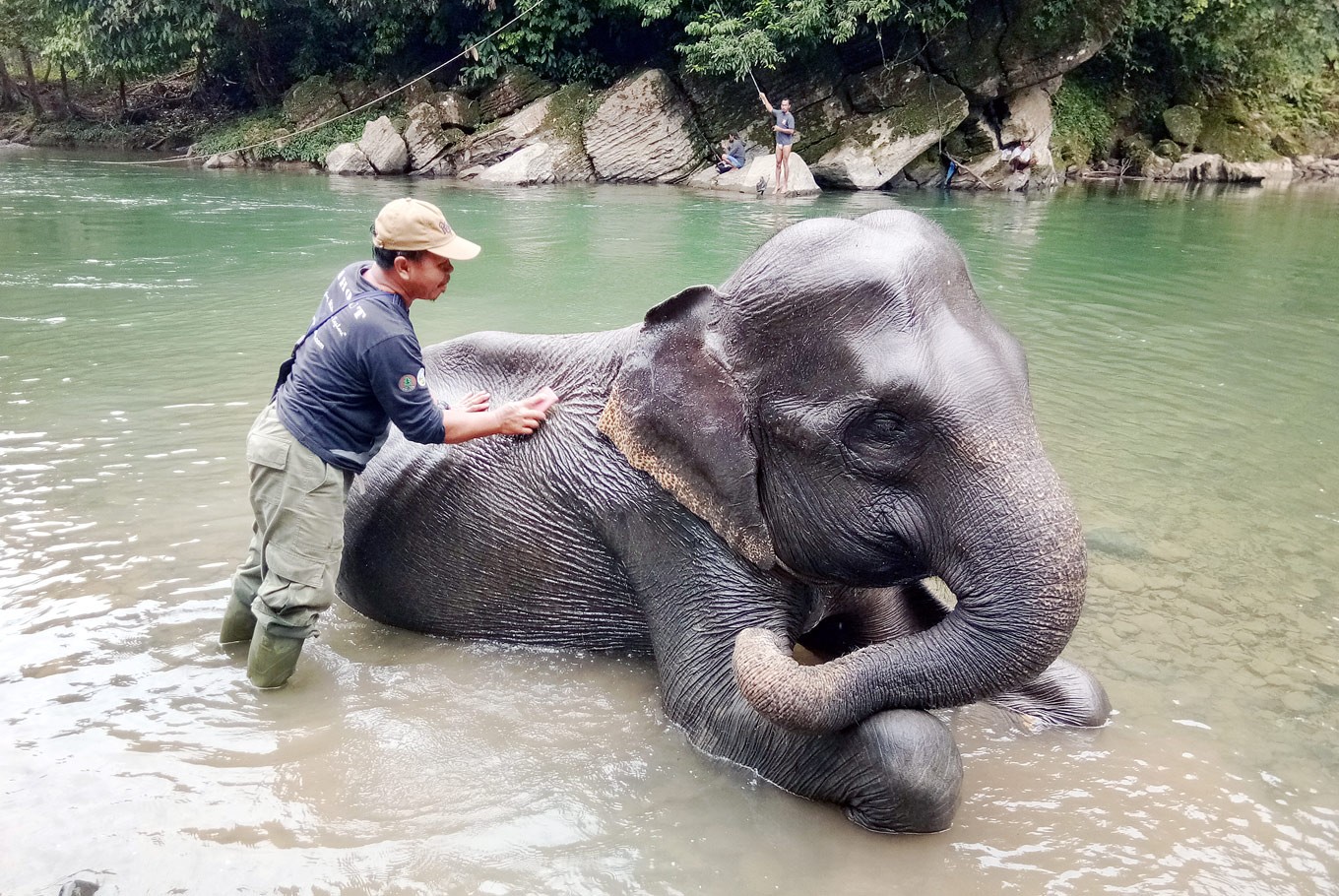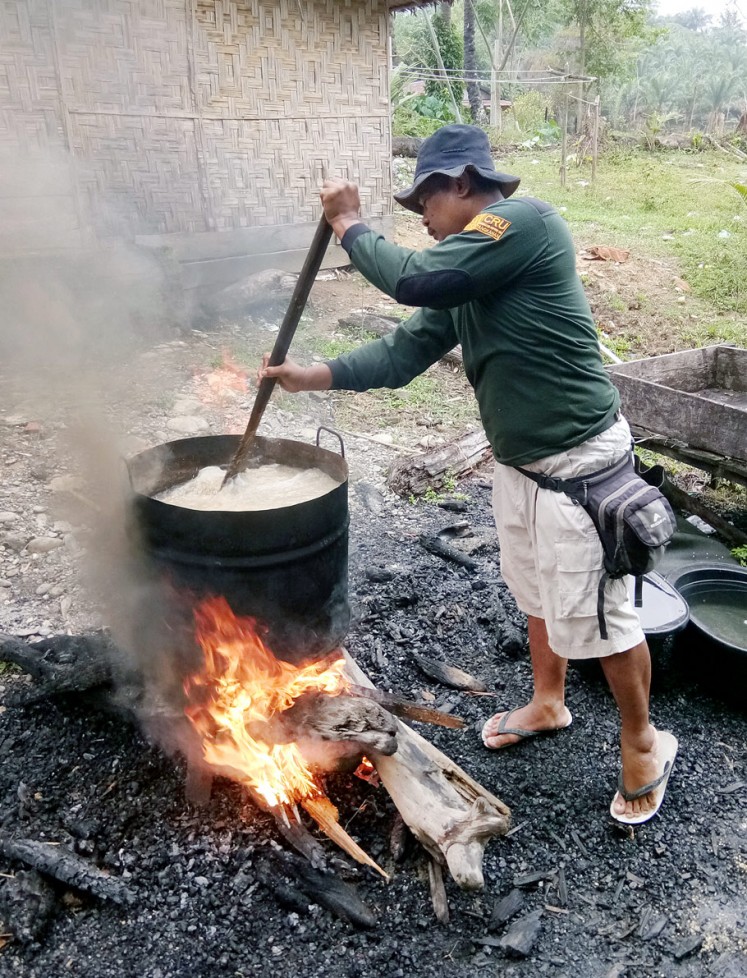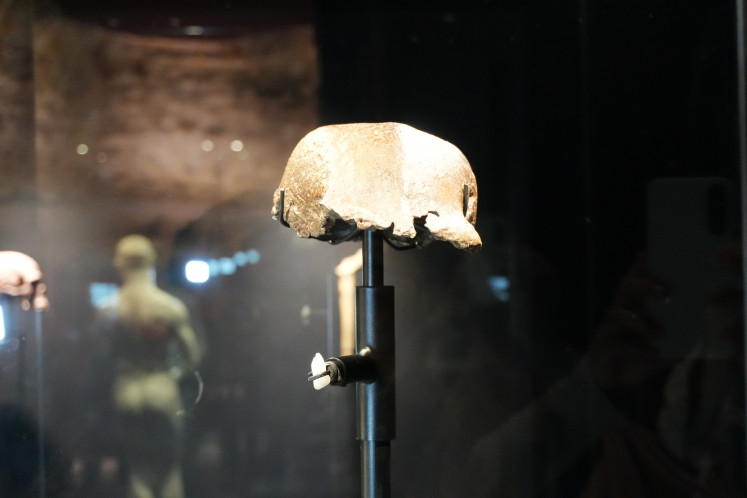Popular Reads
Top Results
Can't find what you're looking for?
View all search resultsPopular Reads
Top Results
Can't find what you're looking for?
View all search resultsPatience pays off for elephants' keepers in North Sumatra
A certain bond, albeit with caveats, seems to define the relationship between tame elephants and their mahout ( keepers) in Mount Leuser National Park’s Tangkahan Elephant Ecotourism Camp in Langkat, North Sumatra.
Change text size
Gift Premium Articles
to Anyone
A
certain bond, albeit with caveats, seems to define the relationship between tame elephants and their mahout ( keepers) in Mount Leuser National Park’s Tangkahan Elephant Ecotourism Camp in Langkat, North Sumatra.
Tangkahan Elephant Ecotourism Camp’s elephant and mahout coordinator Sudiono recalled the time when his wife was feverish, he told her to see a doctor.
“When an elephant is ill, I look after it day and night until it is fully recovered. I am afraid it will die. If it refuses to eat, I’ll go the extra mile to find the food it likes such as ripe bananas,” the 44-year-old said.
Under the current arrangement, all sick elephants have to be referred to the Veterinary Society for Sumatran Wildlife Conservation.
“I don’t really know why I have such a deep affection for elephants, which is just there by itself and is perhaps forged by the many years we have spent together,” Sudiono said.
He and the 11 other mahout under him accompanied Environment and Forestry Ministry officials during a recent visit to Tangkahan, which was formerly an illegal loggers’ transit point.
Reflecting on his own experience, Sudiono said mahout usually developed a feel for their charges after handling them for more than five years by which time “they will instinctively know whether the elephants are angry, tired or hungry”.
However, mahout Raya Agus Ardan, 22, from nearby Kuala Gemoh hamlet, claimed he had already developed chemistry with them in just two years thanks to his ability to “truly empathize with and relate to the elephants with all my soul”.
However, there are no such thing as chemistry, bonds or whatever the mahout terms it when they have to deal with a male elephant in musth, a hormonal phase characterized by a thick tar-like secretion on the sides of the head, testosterone surge and highly aggressive behavior.
“When in must, even the tamest bull becomes uncontrollably wild, won’t hesitate to kill his own mahout, and must be confined until the aggressive period, ranging from one week to one month, is over,” he said.
Another danger mahout may face is dealing with wild elephants. Sudiono recounted the gruesome death of mahout Samidi in 1990 when a wild male elephant he had darted in Krueng Pase, North Aceh, regained consciousness and crushed him to death.
Even tame elephants can be dangerous when taking instructions from their mahout.
“I was once slightly stomped on and kicked by Ida, a female elephant I trained to step over me in 1994 for an entertainment show. I got thrown about 5 meters,” he said.
Another senior mahout, Katiyo, had one of his legs pressed against a tree trunk when he instructed his charge to sit down. “The elephant broke my leg and I couldn’t work for a month,” the cheerful 48-year-old said.
Such incidents have made Sudiono acutely aware of the risks and the need to be on guard at all times. He has even rethought his decision to work as a mahout. “However, I can’t afford to quit because finding another job is so hard,” he said. “Moreover, this civil service employment gives me job security and a pension upon retirement.”
Like Sudiono, Katiyo, too, was quite fearful after witnessing two mahout being killed by elephants during his tenure with a human-elephant conflict management team in 1989 and 1990 in Aceh. This and the government’s declaration of Aceh as a Military Operational Area from 1989 to 1998 forced him to look for another job elsewhere, during which he landed a job at a sand mining project in Lampung that paid him Rp 2 million (US$148) a month, far more than the meager stipend as a mahout in Aceh.
However, he was unhappy and in the 2000s decided to return to Aceh to become a mahout again because “without elephants, something is missing in my life”, he said, adding that to supplement his income, he grew soybeans.
Unlike Sudiono, Katiyo does not care about his employment status. “I love this job so much I don’t care if I have to be a stipend pay-based civil service employee forever. Happiness and bliss is what I experience every time I work with the elephants, which is more than what I could ask for.”
In 2006, Katiyo was granted full civil service employment status. A year later he was sent to Melbourne Zoo to learn elephant management for a month. “Patience pays off,” he concluded.
Hot meal: Mahout Katiyo prepares porridge for his elephants. (JP/Arif Suryobuwono)Ecotourism promotes ‘mahout’ welfare
Being a mahout was a poorly paid job before the development of the Tangkahan Elephant Ecotourism Camp in 2002.
Back in 1993, when working as a mahout for the Aceh chapter of the Natural Resources Conservation Agency (BKSDA Aceh) in Aceh, Sudiono was paid a monthly stipend of Rp 75,000 (US$5.45).
In 2002, he was transferred to Tangkahan, a former transit site for illegal loggers, and in 2006 he was granted full civil servant employment with a monthly salary of Rp 350,000.
He was appointed elephant coordinator in 2014 when the ownership of the elephants and their Conservation Response Unit management was officially transferred from BKSDA Aceh to Mount Leuser National Park Service. His current monthly salary is around Rp 3.5 million.
To make ends meet, Sudiono has to engage in other activities such as asking his wife to grow rice and vegetables in the paddy field he managed to purchase from his savings.
During their previous tenure as mahout in Aceh, he and his colleague, Katiyo, occasionally used the elephants they had trained to entertain people to supplement their meager income.
Sudiono, who learned the skill of taming elephants from two Thai trainers, Intawa Kasuphan and Sen Kachai, at the Elephant Training Center in Lhok Asan, said if an elephant disobeyed his orders, he used a gancu (bull hook or elephant goad) to discipline it.
“That’s the only tool we still use here to control them, but nowadays we don’t use it every day because we don’t want animal lovers to accuse us of abusing the elephants,” he said.
Now that both are civil servants, they no longer have to resort to entertainment shows to make ends meet. “I am not in the elephant entertainment business anymore,” Katiyo said. “I get enough additional income from Tangkahan elephant tourism to supplement my salary.”












